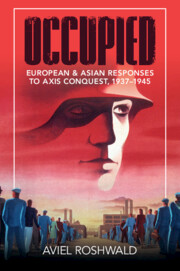Book contents
- Occupied
- Occupied
- Copyright page
- Dedication
- Contents
- Figures
- Maps
- Acknowledgments
- Introduction
- Part I Patriotisms under Occupation (the Netherlands, France, Denmark, and Thailand)
- Prologue to Part I
- 1 Initial Choices and Conditions
- 2 Patriotic Solidarity in the First Flush of Defeat
- 3 The Shifting Parameters of the Patriotically Plausible
- Conclusion to Part I
- Part II Fractured Societies and Fractal Identities: Civil Wars under Occupation (Greece, Yugoslavia, Italy, and China)
- Part III Conquest in the Guise of Liberation (the Philippines, Indonesia, and Ukraine)
- Bibliography
- Index
2 - Patriotic Solidarity in the First Flush of Defeat
from Part I - Patriotisms under Occupation (the Netherlands, France, Denmark, and Thailand)
Published online by Cambridge University Press: 20 April 2023
- Occupied
- Occupied
- Copyright page
- Dedication
- Contents
- Figures
- Maps
- Acknowledgments
- Introduction
- Part I Patriotisms under Occupation (the Netherlands, France, Denmark, and Thailand)
- Prologue to Part I
- 1 Initial Choices and Conditions
- 2 Patriotic Solidarity in the First Flush of Defeat
- 3 The Shifting Parameters of the Patriotically Plausible
- Conclusion to Part I
- Part II Fractured Societies and Fractal Identities: Civil Wars under Occupation (Greece, Yugoslavia, Italy, and China)
- Part III Conquest in the Guise of Liberation (the Philippines, Indonesia, and Ukraine)
- Bibliography
- Index
Summary
The myth of a patriotic closing of the ranks in shared resistance to foreign oppressors was central to the shaping of public memory of the war in much of formerly occupied parts of post-war Eurasia. The fact that significant cross-sections of societies – and not just handfuls of opportunistic “traitors” – may have accommodated, or even collaborated with, Axis occupiers to one degree or another was commonly swept under the carpet in the aftermath of the purge trials that followed liberation. It was only in later decades, if at all, that national historiographies began to contend systematically with the much more complicated historical realities and the uncomfortable moral and political ambiguities they presented.1
- Type
- Chapter
- Information
- OccupiedEuropean and Asian Responses to Axis Conquest, 1937–1945, pp. 38 - 98Publisher: Cambridge University PressPrint publication year: 2023

